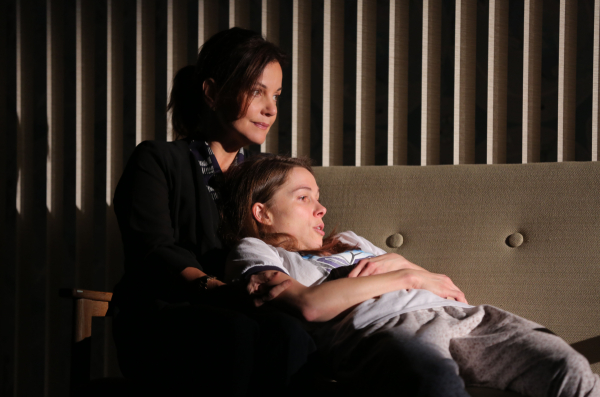Taking Care of Baby

(© Joan Marcus)
To New York audiences, Dennis Kelly is the wildly imaginative Tony Award-winning librettist whose fantastical tales of circus performers and escapologists fill the Shubert Theatre nightly in Broadway’s British import Matilda the Musical. On the heels of this auspicious entrance into the New York theater scene, audiences now have the privilege of experiencing Kelly’s work in its far more modest, natural habitat. His 2007 play Taking Care of Baby, which debuted at the Hampstead Theatre in London, is now playing at New York City Center – Stage II — the smallest of Manhattan Theatre Club’s off-Broadway venues.
While there may be no tall tales or characters of mythical proportions in this family drama, Kelly gives a fitting platform to his talent for creative storytelling.
Kelly creates a faux docu-drama (directed with minimalist precision by Erica Schmidt) that follows a woman named Donna McAuliffe whose two children, in separate instances, mysteriously died while in her care. She returns to her parents’ home after serving a short stint in jail for the murder of her second child, Jake — a sentence that was overturned on appeal. As Donna, the “Double-Death Murderer,” fights to cleanse herself of this title, Kelly brings the case into the court of public opinion, framing the play as if we were witnessing the making of a documentary about Donna and her family. Scenes are even preceded by loudspeaker announcements (sound design by Fitz Patton) of the following disclaimer:
“The following has been taken word for word from interviews and correspondence. Nothing has been added and everything is in the subject’s own words, though some editing has taken place. Names have not been changed.”
(These characters and their words are, in fact, Kelly’s own creations, though the story loosely alludes to the 1999 case of Sally Clark.)
Schmidt presents these onstage “interviews” more like depositions, building both sides of Donna’s case until the audience is finally asked to draw its own conclusions about the truth of what happened to her two children. Truth, unfortunately, proves to be a more fluid concept than anticipated.
A stellar cast wades its way through the web of nuanced ambiguities that Kelly maps out for us. Each of the “witnesses” proffers an opening statement of sorts as they speak from chairs that line the back of the stage, exiting after his or her piece has been said. The play then launches into the framework of traditional scenes as well as follow-up interviews (enhanced with only a few minor set pieces by designer Laura Jellinek) that continually subvert and contradict all of our initial judgments.
Kristen Bush leads the cast as Donna McAuliffe, who embodies the ache of a grieving mother while leaving more than a few lingering doubts in our minds as to her innocence. These doubts are only inflamed by the persuasive statements made by her ex-husband, Martin (Francois Battiste) who, completely convinced of her guilt, continues to hold onto the anger and hurt of a heartbroken father.
Seasoned veterans of the stage Margaret Colin and Reed Birney offer standout performances, adding more meat to the core issue of “truth” that drives the play. Colin plays Lynn Barrie, Donna’s headstrong politician of a mother, who carries herself with regal confidence in her perfectly tailored Hillary Clinton power suit (designed by Jessica Pabst). Since being disowned by the Democratic Party after her daughter’s conviction, Lynn decides to run for City Council on an independent ticket with a newfound desire for public justice. However, as we see her priorities slowly shift from justice to victory, Colin indiscernibly peels off this honorable mask, eerily shaking our sense of trust and questioning our abilities to discern a truth from a manipulative lie.
Birney poses a similar conundrum as psychologist Dr. Millard. Millard (who offers the last and possibly the longest of the “opening statements”) asserts that Donna suffers from a psychiatric disorder that drives mothers to harm their children out of a desire to protect them from the world’s tragedies. As the “trial” unfolds, however, he finds himself defending the legitimacy of his claim. His initially bulletproof exterior begins to crack before our very eyes as the smug yet authoritative confidence that he introduced in his elaborate introductory lecture is worn thin.
Those dying for a big dramatic disclosure of truth at the end of this dizzying ride may not get the satisfaction they came for, instead leaving in a frustrating yet wonderful state of confusion. As the reliability of Kelly’s characters fall under suspicion one by one, we find that the truth may be forever buried among all of these contradictory stories. Or perhaps we can take solace in the fact that there may be no truth to find at all.











